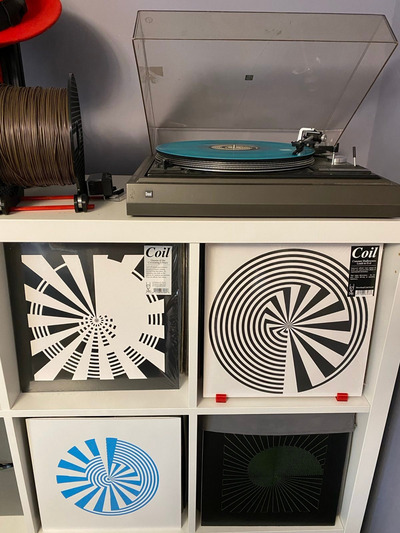
Happy 2024!
DAIS have continued their programme of posthumous
Coil remasters and re-issues.
Constant Shallowness Leads To
Evil
was remastered by Josh Bonati in 2021 and re-released in 2022 in a dizzying
array of different packaging variants. The original releases in 2000 had barely
any artwork, and given that void I think Nathaniel Young has done a great job
of creating something compelling.
A limited number of the original re-issue have special lenticular covers, although
these were not sold by any distributors outside the US. I tried to find a copy on
my trip to
Portland in 2022, to no avail.
Last year DAIS followed
Constant with
Queens Of The Circulating
Library,
same deal: limited lenticular covers, US only.
Both are also available digital-only, e.g. on
Bandcamp:
Constant ,
Queens .
The original, pre-remastered releases have been freely available on archive.org for a long time:
Constant ,
Queens
Both of these releases feel to me that they were made available by the group
somewhat as an afterthought, having been produced primarily as part of their
live efforts. (I'm speculating freely here, it might not be true). Live takes
of some of this material exist in the form of
Coil Presents Time
Machines, which
has not (yet) been reissued. In my opinion this is a really compelling
recording. I vividly remember listening to this whilst trying to get an hour's
rest in a hotel somewhere on a work trip. It took me to some strange places!
I'll leave you from one of my favourite moments from "Colour Sound Oblivion",
Coil's video collection of live backdrops. When this was performed live it
was also called "Constant Shallowness Leads To Evil", although it's distinct
from the material on the LP:
also available on
archive.org. A version of
this
Constant made it onto a Russian live bootleg, which is
available on
Spotify
and Bandcamp
complete with some John Balance banter:
we only do this on religious holidays
Constant Shallowness Leads to Evil by Coil
 Happy 2024!
DAIS have continued their programme of posthumous Coil remasters and re-issues.
Constant Shallowness Leads To
Evil
was remastered by Josh Bonati in 2021 and re-released in 2022 in a dizzying
array of different packaging variants. The original releases in 2000 had barely
any artwork, and given that void I think Nathaniel Young has done a great job
of creating something compelling.
A limited number of the original re-issue have special lenticular covers, although
these were not sold by any distributors outside the US. I tried to find a copy on
my trip to Portland in 2022, to no avail.
Last year DAIS followed Constant with Queens Of The Circulating
Library,
same deal: limited lenticular covers, US only.
Both are also available digital-only, e.g. on Bandcamp:
Constant ,
Queens .
The original, pre-remastered releases have been freely available on archive.org for a long time:
Constant ,
Queens
Both of these releases feel to me that they were made available by the group
somewhat as an afterthought, having been produced primarily as part of their
live efforts. (I'm speculating freely here, it might not be true). Live takes
of some of this material exist in the form of Coil Presents Time
Machines, which
has not (yet) been reissued. In my opinion this is a really compelling
recording. I vividly remember listening to this whilst trying to get an hour's
rest in a hotel somewhere on a work trip. It took me to some strange places!
I'll leave you from one of my favourite moments from "Colour Sound Oblivion",
Coil's video collection of live backdrops. When this was performed live it
was also called "Constant Shallowness Leads To Evil", although it's distinct
from the material on the LP:
also available on
archive.org. A version of
this Constant made it onto a Russian live bootleg, which is available on
Spotify
and Bandcamp
complete with some John Balance banter:
Happy 2024!
DAIS have continued their programme of posthumous Coil remasters and re-issues.
Constant Shallowness Leads To
Evil
was remastered by Josh Bonati in 2021 and re-released in 2022 in a dizzying
array of different packaging variants. The original releases in 2000 had barely
any artwork, and given that void I think Nathaniel Young has done a great job
of creating something compelling.
A limited number of the original re-issue have special lenticular covers, although
these were not sold by any distributors outside the US. I tried to find a copy on
my trip to Portland in 2022, to no avail.
Last year DAIS followed Constant with Queens Of The Circulating
Library,
same deal: limited lenticular covers, US only.
Both are also available digital-only, e.g. on Bandcamp:
Constant ,
Queens .
The original, pre-remastered releases have been freely available on archive.org for a long time:
Constant ,
Queens
Both of these releases feel to me that they were made available by the group
somewhat as an afterthought, having been produced primarily as part of their
live efforts. (I'm speculating freely here, it might not be true). Live takes
of some of this material exist in the form of Coil Presents Time
Machines, which
has not (yet) been reissued. In my opinion this is a really compelling
recording. I vividly remember listening to this whilst trying to get an hour's
rest in a hotel somewhere on a work trip. It took me to some strange places!
I'll leave you from one of my favourite moments from "Colour Sound Oblivion",
Coil's video collection of live backdrops. When this was performed live it
was also called "Constant Shallowness Leads To Evil", although it's distinct
from the material on the LP:
also available on
archive.org. A version of
this Constant made it onto a Russian live bootleg, which is available on
Spotify
and Bandcamp
complete with some John Balance banter: 